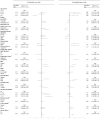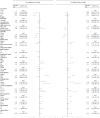Factors associated with psychological stress and distress among Korean adults: the results from Korea National Health and Nutrition Examination Survey
- PMID: 32934275
- PMCID: PMC7492217
- DOI: 10.1038/s41598-020-71789-y
Factors associated with psychological stress and distress among Korean adults: the results from Korea National Health and Nutrition Examination Survey
Abstract
The prevalence of stress and distress has been increasing and being important public health issues; nevertheless, few studies have assessed the factors associated at the population level. This study identified factors associated and how they differentially influence stress and distress. A total of 35,105 individuals aged 19 years and older using nationally representative data from the Korea National Health and Nutrition Examination Survey (2007-2012) were included in the study. Subjects were differentiated by gender and psychological state (no symptoms, stress, distress). The associations of socio-demographics, psychosocial factors, health behaviours, and chronic illness with psychological states were analysed by gender. Socio-demographics and psychosocial factors such as lower household income, lower education level, living alone or negative outcome of marriage, and unemployment were associated with distress in both genders. Male and female educated higher and with short sleep duration, male living alone and with higher household income, and female married and with a lower household income was associated with stress. A perceived body image of slim or fat was associated with distress and stress in both genders. Behavioural factors, such as smoking, higher alcohol consumption, and abnormal calorie intake, were associated with stress and distress in both genders, with the exception of alcohol consumption in distress and abnormal calorie intake in stress of male. Socio-economic deprivation and negative psychosocial and behavioural factors were differently associated with psychological distress or stress by gender. Intervention strategies for distress and stress should be specifically tailored regarding these differences.
Conflict of interest statement
The authors declare no competing interests.
Figures
Similar articles
-
The prevalence of and factors associated with urinary cotinine-verified smoking in Korean adults: The 2008-2011 Korea National Health and Nutrition Examination Survey.PLoS One. 2018 Jun 11;13(6):e0198814. doi: 10.1371/journal.pone.0198814. eCollection 2018. PLoS One. 2018. PMID: 29889856 Free PMC article.
-
Gender-specific secular trends and related factors of high perceived stress level among Korean older adults: a nation-wide serial cross-sectional study.BMC Public Health. 2025 Feb 4;25(1):450. doi: 10.1186/s12889-025-21644-4. BMC Public Health. 2025. PMID: 39905356 Free PMC article.
-
Factors associated with health-related quality of life in Koreans aged over 50 Years: the fourth and fifth Korea National Health and Nutrition Examination Survey.Health Qual Life Outcomes. 2017 Dec 16;15(1):243. doi: 10.1186/s12955-017-0816-4. Health Qual Life Outcomes. 2017. PMID: 29246226 Free PMC article.
-
Psychological distress may affect nutrition indicators in Australian adults.Appetite. 2015 Jul;90:144-53. doi: 10.1016/j.appet.2015.02.003. Epub 2015 Feb 26. Appetite. 2015. PMID: 25728880
-
Health-Related Quality of Life in Korean Adults with Hearing Impairment: The Korea National Health and Nutrition Examination Survey 2010 to 2012.PLoS One. 2016 Oct 6;11(10):e0163999. doi: 10.1371/journal.pone.0163999. eCollection 2016. PLoS One. 2016. PMID: 27711203 Free PMC article.
Cited by
-
The prevalence and its associated factors of psychological stress among middle school students in China: pooled evidence from a systematic scoping review.Front Public Health. 2024 Apr 17;12:1358210. doi: 10.3389/fpubh.2024.1358210. eCollection 2024. Front Public Health. 2024. PMID: 38694991 Free PMC article.
-
Salivary cortisol, dehydroepiandrosterone, and chromogranin A levels in patients with gingivitis and periodontitis and a novel biomarker for psychological stress.Front Endocrinol (Lausanne). 2023 Apr 11;14:1147739. doi: 10.3389/fendo.2023.1147739. eCollection 2023. Front Endocrinol (Lausanne). 2023. PMID: 37113482 Free PMC article.
-
Is Spiritual Well-Being a Protective Factor Against Stress? An Analysis in a Sample of Peruvian Christians.Psychiatry Investig. 2025 May;22(5):504-512. doi: 10.30773/pi.2024.0146. Epub 2025 May 15. Psychiatry Investig. 2025. PMID: 40404380 Free PMC article.
-
Potential mechanisms linking psychological stress to bone health.Int J Med Sci. 2021 Jan 1;18(3):604-614. doi: 10.7150/ijms.50680. eCollection 2021. Int J Med Sci. 2021. PMID: 33437195 Free PMC article. Review.
-
Cathepsin K deficiency prevented stress-related thrombosis in a mouse FeCl3 model.Cell Mol Life Sci. 2024 May 4;81(1):205. doi: 10.1007/s00018-024-05240-0. Cell Mol Life Sci. 2024. PMID: 38703204 Free PMC article.
References
-
- Stress in America: Paying with Our Health. (American Psychological Association, Worcester, 2015).
-
- Casey L. Stress and Wellbeing in Australia in 2011: A State of the Nation Survey. Melbourne: Australian Psychological Society; 2011.
-
- Korea Centres for Disease Control and Prevention. Korean National Health and Nutrition Examination Survey. http://knhanes.cdc.go.kr/knhanes/main.do (2016).
-
- Kottler J, Chen D. Stress Management and Prevention: Applications to Daily Life. Boston: Cengage Learning; 2007.
-
- Paradies Y. A theoretical review of psychosocial stress and health. Int. J. Psychol. Res. 2010;5:205–222.
MeSH terms
LinkOut - more resources
Full Text Sources
Medical
Research Materials



